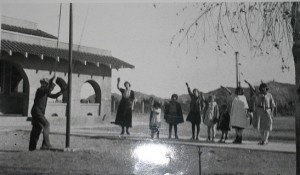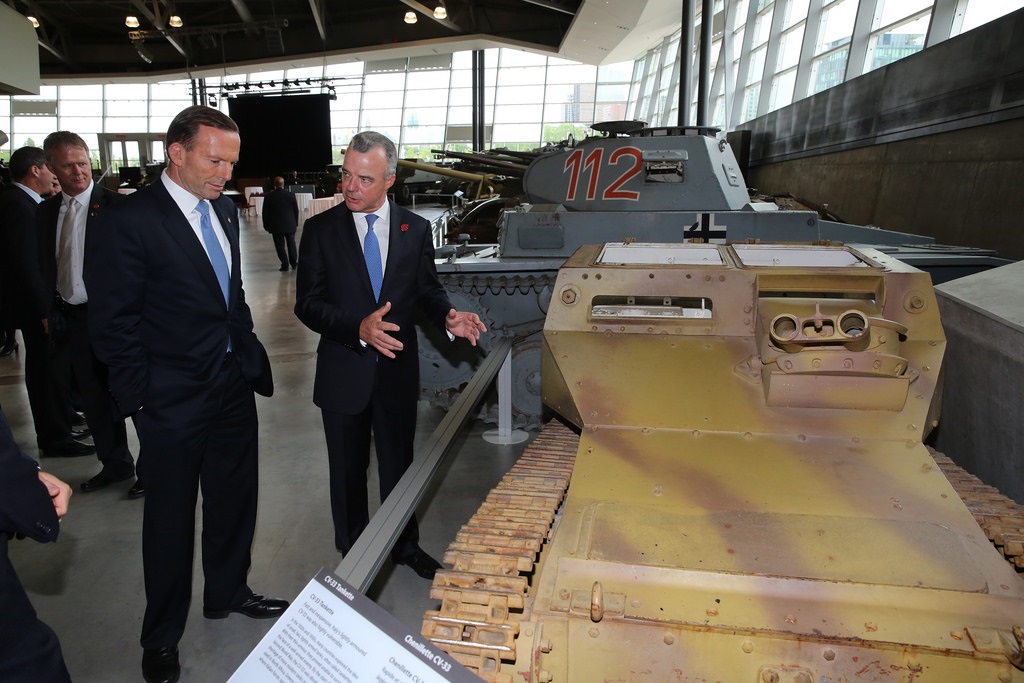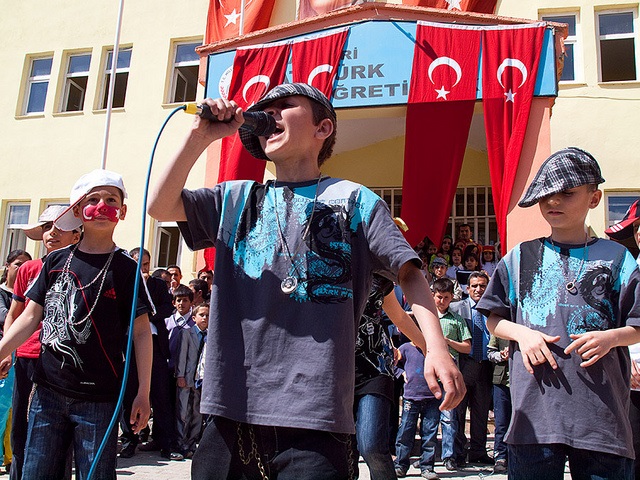‘Highlights reel: Margaret Macmillan on history wars’, Honest History, 28 July 2014
As the Donnelly-Wiltshire report on the national curriculum is about to be handed to the Australian Minister for Education, Christopher Pyne, it is instructive to look at a distinguished historian’s take on previous episodes where governments have tried their hands at curriculum writing, particularly in history.
Like our previous highlights reel from Margaret Macmillan, this one is from her 2007 book, The Uses and Abuses of History (titled in some editions, Dangerous Games). Resources on this site relating to the Australian curriculum review will be augmented when the review report is released.

Flag salute, Goffs School, California, USA, c. 1912 (Flickr Commons/Chuck Coker) This style of salute was common in schools in the US pre-Hitler and was known as the Bellamy salute.
Highlights
United States
The first President Bush began and President Clinton continued a project to establish National Education Goals. One of the core subjects was history. The National Council for History Standards produced guidelines which included more material on multiculturalism, non-Western civilisations, womens’ history and black history than had been usual in previous curricula. The guidelines were for state education administrations to adopt or not as they pleased.
Lynne Cheney, a Republican conservative, wife of Dick, attacked the guidelines for their ‘grim and gloomy’ view and their rejection of chronological history. Rush Limbaugh, conservative shock jock, said children were being encouraged to believe the United States was ‘inherently evil’. A conservative senator called them a vicious attack on Western civilisation. There was nationwide controversy.
The public and often bitter debate over the history standards was always about more than curriculum. It came at a time when the United States was uncertain about its role in the post-Cold War world and about its own society. The neoconservatives feared the United States no longer possessed the will to use its enormous power. At home, conservative Americans saw a decline in family values, which for them was often symbolised by legalised abortion. And many Americans wondered whether there truly was a central American identity anymore …
If Americans did not share a common sense of the past, what would happen to the dream expressed in the widely used government motto “E pluribus unum”? Would it come to stand for “Out of the one, many,” rather than the other way around? (119-20)
There are many sources available on the history standards battle in the United States. By 2007, when Macmillan’s book came out, the standards had been widely adopted, although the rise of the Tea Party Republicans since then has helped fan new fires. Gary Nash, one of the standards developers, wrote about the episode in 1994 and a book in 1996 was one of the many analyses of what happened. There is currently a fight in Texas over history textbooks.
Turkey
In countries that are, for whatever reason, lacking in self-confidence, the teaching of history can be an even more sensitive matter. In Turkey, the government takes a strong interest in the curriculum. Historians who argue for greater attention being paid to the history of Turkey’s minorities or who dare to suggest that there was an Armenian genocide in World War I can find themselves in serious trouble. (120)
Related: a 2009 article, a 2014 article.
Russia
In Russia, President Vladimir Putin took a personal interest in the writing of new “patriotic” history textbooks being used in the schools. He handed out grants to approved authors (one was a former professor of Marxist-Leninist social science who had transformed himself into a historian), and his government gave itself the power to determine what textbooks were used … [He told teachers] that the time had to come to get rid of the “muddle” and have a more openly nationalistic view of the past. (120)
Related from The Economist 2007, a 2008 book and NBC News 2013.
Other countries
Chinese history textbooks have emphasised Chinese suffering at the hands of the imperialists while promoting the leadership role of the Communist Party. Non-mainstream versions have been banned. In South Africa and Ireland the position at the time Macmillan wrote was more encouraging, with rounded histories accepted. Chinese developments are described in a 2014 article. Another report about China from 2018.
Museums, ‘days’ and history
Macmillan suggests it is unclear in most societies whether the role of history museums is to commemorate or to teach. ‘The distinction between museums and memorials is a blurred one and, as a result, gives rise to often angry debates over how the past should be portrayed and interpreted.’ (123) There also have been disputes in a number of countries (Canada, the United States, Venezuela, Germany, France, Russia, Spain, Austria, Japan, Israel) about how to commemorate important anniversaries.
Macmillan discusses 1990s cases in Washington and Ottawa where veterans took exception to the portrayal of-war related material in museums. Being involved in a war was seen by veterans as giving them a better perspective on war than those who studied and portrayed it later.
Macmillan was called in as an assessor in the Ottawa controversy. ‘”History”, I concluded, “should not be written to make the present generation feel good but to remind us that human affairs are complicated.”‘ (127) The Canadian story is of interest, given the recent article by Yves Frenette about the Harper Government’s approach to history and museums and the interest expressed by the Australian War Memorial in joint work with the Canadians.
 Prime Minister Abbott and Australian War Memorial Director Nelson, Canadian War Museum, June 2014 (Canadian High Commission, Canberra)
Prime Minister Abbott and Australian War Memorial Director Nelson, Canadian War Museum, June 2014 (Canadian High Commission, Canberra)Summing up
History has so often produced conflicts, but it can also help in bringing about reconciliation. The purpose of the truth and reconciliation commissions in South Africa and Chile was to expose the past in all its seaminess and to move on. That does not mean dwelling on past sufferings or past misdeeds to the exclusion of all else, but accepting that they have occurred and trying to assess their meaning.
When John Howard was trying to promote a national history curriculum in Australia, the principal of a girls’ high school in Sydney described how she dealt with the contested story of the arrival of the first whites. “We canvass all the terms for white settlement: colonialism, invasion and genocide.” Examining the past honestly, whether that is painful for some people or not, is the only way for societies to become mature and to build bridges to others. (136)
(Margaret Macmillan, The Uses and Abuses of History, Profile Books, London, e-book edition, 2010; first published 2009; US edition, Random House, New York, 2009)



Leave a Reply
You must be logged in to post a comment.